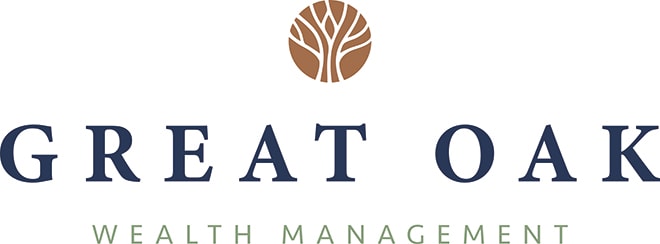As fee-only CERTIFIED FINANCIAL PLANNER®, professionals we at Great Oak Wealth Management do not sell life insurance. Our objectivity gives us a significant advantage in our review of existing policies and the gaps we find all too often in insurance coverage. We expect the insurance piece of your financial puzzle to change over time. Changes may include converting a term policy or even purchasing an entirely different type of policy. Having the right policy and policy terms in place will bring you peace of mind that you are efficiently planning for the inevitable.
There are countless life insurance solutions out there with an infinite amount of riders to customize those policies. Prospective clients often mention they have multiple types of policies in place and aren’t exactly sure of the rationale for the assortment. Life insurance isn’t free; each policy should be fulfilling a specific purpose.
Our blog post, ‘How Much Life Insurance Do You Really Need’ is an excellent place to start the insurance discussion. Once you have determined how much insurance you need, the next step is to determine what type of insurance is best for you. Is a term policy or a permanent policy like universal, variable, or whole life the best fit for you?
The efficiency of term
Term insurance is often the starting point because it is cost-efficient, straightforward, and fits the most common need of protecting your family against the potential loss of an income. Term policies are not permanent; when they reach the end of the designated term, they cease. The temporary aspect helps term policies to be the most cost-efficient option in most cases.
As your wealth grows, your goals change, your financial picture becomes more complicated. You must continually re-evaluate your insurance need. Evaluating your insurance should be on your to-do list every few years. Outside of the regular reviews, there are a few specific times your hand is forced to re-evaluate, such as when your family grows or when your income changes.
What if I need something more permanent?
Another time your hand is forced to re-evaluate is when your term policy is in its conversion period; remember, not all term policies allow a conversion. When we hear the word conversion, we typically think of Roth IRAs. In the insurance world, we are using the term ‘conversion’ differently. Remember, you can purchase term policies that range anywhere from 10-30 years. Your term policy will likely offer the option to convert to a permanent policy during a specific conversion period sometime during the 10–30 year timeframe. Check your specific policy for the eligibility and the conversion period details.
A conversion from a term policy to a permanent policy means moving from one policy type to another. There is rarely a cost to converting term policies, just paperwork. After converting, you will subject to the parameters of the new policy, including a new premium.
To convert a term policy or not convert
Weighing the pros and cons of the conversion is a financial decision. Your premium will almost definitely increase once you move to permanent insurance. Permanent insurance stays with you until death or until you cancel the policy. You will be older at the conversion than you were when you purchased the term insurance, impacting the increase in your premium. However, you won’t have to redo your health underwriting because your rating at your original underwriting will carry over.
The advantage of skipping the health underwriting can make a conversion a desirable option, even with a cost increase to those who have had health changes since they purchased their original term policies.
Suppose your health has changed dramatically since your original underwriting. In that case, a conversion may be the only way you can access a permanent policy. Consider you purchased a term policy when you were thirty, then in your late forties received a grim diagnosis. In the years since you purchased the term policy, your income has increased dramatically, and your policy no longer cuts it to replace your income if your diagnosis takes a turn for the worse. Unfortunately, you will be rated so negatively on a health underwriting because of the diagnosis, a new policy prohibitively expensive, or not even available. Luckily, you still have the conversion option on that old term policy. The conversion is the only way you will be able to get the permanent policy you need.
You should consider converting term insurance when something has changed, impacting your need for insurance. For instance, when your income increases dramatically, your financial picture will become more complicated. You must consider how the insurance policy could impact your tax projections, meeting your income replacement needs and your estate planning strategy. Converting your policy can help solve the need for a more substantial insurance policy to cover your family’s needs should you pass.
I think I need permanent insurance
Once the scales start to tip towards a need for permanent insurance, it is time to analyze further. The scales are starting to tip towards permanent insurance when you are checking the boxes of making over $300,000 a year, and/or you have accumulated over $2 million in assets.
Converting a term policy to a permanent policy is one option to acquire a permanent policy. You could also purchase a permanent policy outright. The insurance world has developed a lot of creative uses for permanent insurance besides their original intention. Today permanent policies are being advertised as alternative college-saving vehicles, estate planning strategies, and unique tax planning approaches, to name a few. The merits of using a permanent policy for these situations cannot be evaluated with a broad brush. We may do a deep dive on each approach in a future blog post.
Insurance isn’t free. Your policy should fit your specific needs and your specific financial plan. Continuing to analyze your policy and its options should be a part of your regular checklist. If you aren’t sure what to do with an existing policy or if a conversion is an answer, work with a CERTIFIED FINANCIAL PLANNER®, professional who can provide you with a thorough analysis.








